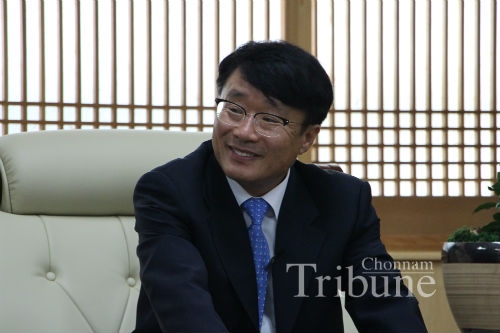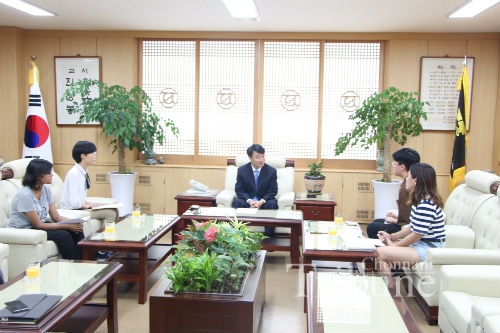
Q. What does CNU’s new slogan ‘Pride & Hope’ exactly mean?
A: Since CNU first opened its doors in 1952, the university devoted itself to the development of our nation and its democracy. Every time our country was going through difficult times, we endeavored to protect liberty, peace, democracy and human rights and sacrificed for them. It is a proud history we should feel ‘Pride’ of and this splendid history should bloom into future’s ‘Hope’. Being proud of our past is a strong foundation for development in the future. In a sense that the democratic spirit of CNU should be the pride of students at the university and that the spirit should be changed into hope, I suggested ‘Pride & Hope’ as our new slogan.
Q. Could you tell us about the five agendas and 20 strategic subjects you are working on?
A: To carry out the visions as one of the national flagship universities, five agendas of, ‘steady CNUians with long-term views’, ‘researchers’ friend, CNU’, ‘leading university beloved by locals’, ‘My family garden, happy companion’, ‘Common sense and reasonableness, dreaming of the future’ have been set in each section of education, research, locals, welfare, and administration with 20 strategic subjects and 100 core projects.
We will strive to foster and nurture students with imagination in the humanities and creativity in natural science by conducting convergence education. CNU will be a campus with world-famous researchers by carefully considering and caring about the researchers. To be the university that is loved by the locals, CNU will serve the interest of local societies’ discourses and economy and will expand lifelong education for local residents. CNU will seek vibrant student culture, promote culture of peaceful coexistence among CNU members and will ultimately accompany happily with every member at our university. We will respect diversity and autonomy but at the same time will keep the basis of innovation to find a bright future as a national flagship university.
Q. The fourth industrial revolution became reality nowadays and the education environment is also changing due to the new wave. How do you think students should prepare for this flow? And how is our university preparing for the fourth industrial revolution?
A: With the age of industry 4.0, society will require a person who can adapt to changes easily and think flexibly. To be a person like that students should have a basic frame which makes them able to accept different kinds or new types of knowledge. We should break the walls between existing disciplines and majors. Students need both humanistic imagination and scientific creativity. Reading classic literary works and practicing writing and speaking skills with those books could be helpful to enhance the abilities of students. We should break down the barriers of thought and tear down the boundaries of learning. The era of industry 4.0 requires education based on the conversion and integration of multiple areas and CNU needs new curricula which meet these needs. Our university is already working on developing a curriculum which conveys conversion and integration of multiple areas. We are also planning to make a new college that is characteristic of convergence in education across disciplines and this new college will be a center of change. The new college will also help international students at CNU to understand and adapt to Korean culture by serving them with classes related to Korean cultures. The existing educational systems which have conversing characteristics such as double majoring and the School of Self-designed Interdisciplinary Studies will also be enhanced.
Q. Could you tell us more about what the project, ‘Education based on the Convergence and Integration of Multiple Areas’, and how are you going to realize the project?
A: CNU has more than 130 majors. To face the wave of the forth industrial revolution, we should make new majors and colleges in order to meet the needs of students, and should converse or close some majors which lag behind. More than anything else, we provide a converging and integrating education beyond the walls of each major. As I mentioned earlier, CNU is already planning to make major curriculum changes. We will make the College of Convergence, and develop classes which integrate humanities and natural science. Also, the university is planning to enhance major curricula including double major courses, multi-semester courses, and dual-degree programs between universities.
Q. In the absence of the General Student Council, do you have any special plans for effective communication with the university students and other members?
A: During the first six-months as the President of CNU, I faced various opinions about running the university and now communication is more important than ever. I try to communicate with members of the university with the policy of ‘three-direct administration’. First, I spoke directly with every member. Second, I opened the president’s office and the administration headquarters to meet everyone directly at any time. Finally, I have been immediately and directly responding to the university members’ requests and needs. I have tried to build a direct channel with groups and representatives of different members in our university including students, professors, unions and workers and I have already met couple of them. However, as the General Student Council is absent right now, I will discuss students’ problems and needs with the Emergency Response Commission. I hope the council will be formed quickly in the future and then I will be able to discuss the problems in depth with them.
Q. Do you have any advice for CNUians as the president of the university?
A: I have studied law all my life. Jurisprudence is a study of justice and justice gives each person his or her due. I will make CNU into a place where members get what he or she deserves, where justice works. Zelkova is the tree representing CNU. It is a plant which sprouts and grows on barren soil and provides its wide shade for many people to rest. I wish our students to be like zelkova. You might glow little bit slower than the others, but with slow and steady steps you will go on to to leap into a giant tree which protects the village. I hope our students to be people who have the last laugh.


